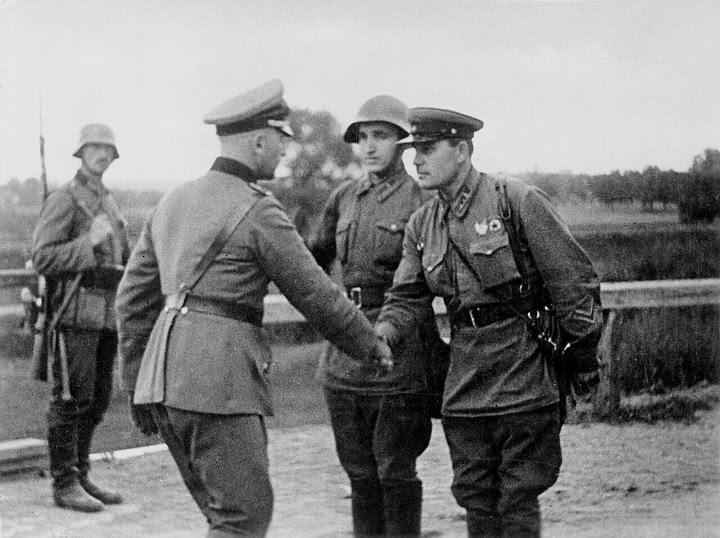FACT: The Soviet Union Was an Early ALLY of Nazi Germany and One of World War II's Aggressor Nations.
The Nazis, fascist Italy, imperial Japan and the Soviet Union were the principal aggressor nations in World War II.
The Japanese kicked things off with attacks on Chinese Manchuria in 1931. By 1937, the nations were at full-scale war.
Italy invaded Ethiopia on October 3, 1935.
Then Nazi Germany, after taking over Austria and Czechoslovakia, invaded Poland on September 1, 1939.
But what is often forgotten are the then-secret provisions of the Molotov-Ribbentrop Pact, officially the Treaty of Non-Aggression between Germany and the Union of Soviet Socialist Republics but more commonly known by the names of the foreign ministers of the Soviet Union and Germany. It was signed in August 1939.
But the secret provisions were that the Soviets would invade Poland from the east after Germany invaded from the west, with Poland to be divided between Germany and the Soviet Union along the lines of the Narev, Vistula, and San rivers. The Soviets were also given a free hand to invade and annex the Baltic nations of Estonia, Latvia and Lithuania, which it did so in 1940. Also that year the Soviets invaded Finland after demands for territorial concessions were rejected by the Finns.
On September 17, 1939, Soviet troops invaded Poland.
Poland. September 20, 1939. An officer of the Wehrmacht, an officer of the Red Army and an interpreter on the demarcation line.
While the German occupation of Poland was barbaric, the Soviets also desired to wipe out any possibility of a resurgence of Polish nationalism. So, just as the Germans put into effect Intelligenzaktion Pommern, an operation to eradicate the Polish intelligentsia, the Sovietson a lower scale massacred over 22,000 Polish prisoners of war in the Katyn forest. About 8,000 were Polish military officers, another 6,000 police officers and the remainder various former landowners, factory owners and local officials.
Ironically, it was the Nazis that discovered the graves of the Poles and the Soviets denied responsbility until 1990. In 1992 the government of Russia finally acknowledged the secret provisions of the Molotov-Ribbentrop Pact, even though the West had long known its provisions.
And what does Russia's Vladimir Putin say about all this?
He blames POLAND for starting World War II !!!
February 2024
Interview with Tucker Carlson
The Japanese kicked things off with attacks on Chinese Manchuria in 1931. By 1937, the nations were at full-scale war.
Italy invaded Ethiopia on October 3, 1935.
Then Nazi Germany, after taking over Austria and Czechoslovakia, invaded Poland on September 1, 1939.
But what is often forgotten are the then-secret provisions of the Molotov-Ribbentrop Pact, officially the Treaty of Non-Aggression between Germany and the Union of Soviet Socialist Republics but more commonly known by the names of the foreign ministers of the Soviet Union and Germany. It was signed in August 1939.
But the secret provisions were that the Soviets would invade Poland from the east after Germany invaded from the west, with Poland to be divided between Germany and the Soviet Union along the lines of the Narev, Vistula, and San rivers. The Soviets were also given a free hand to invade and annex the Baltic nations of Estonia, Latvia and Lithuania, which it did so in 1940. Also that year the Soviets invaded Finland after demands for territorial concessions were rejected by the Finns.
On September 17, 1939, Soviet troops invaded Poland.
Poland. September 20, 1939. An officer of the Wehrmacht, an officer of the Red Army and an interpreter on the demarcation line.
While the German occupation of Poland was barbaric, the Soviets also desired to wipe out any possibility of a resurgence of Polish nationalism. So, just as the Germans put into effect Intelligenzaktion Pommern, an operation to eradicate the Polish intelligentsia, the Sovietson a lower scale massacred over 22,000 Polish prisoners of war in the Katyn forest. About 8,000 were Polish military officers, another 6,000 police officers and the remainder various former landowners, factory owners and local officials.
Ironically, it was the Nazis that discovered the graves of the Poles and the Soviets denied responsbility until 1990. In 1992 the government of Russia finally acknowledged the secret provisions of the Molotov-Ribbentrop Pact, even though the West had long known its provisions.
And what does Russia's Vladimir Putin say about all this?
He blames POLAND for starting World War II !!!
"(The Poles) went too far, pushing Hitler to start World War II by attacking them. Why was it Poland against whom the war started on 1 September 1939? Poland turned out to be uncompromising, and Hitler had nothing to do but start implementing his plans with Poland."
- Vladimir PutinFebruary 2024
Interview with Tucker Carlson






